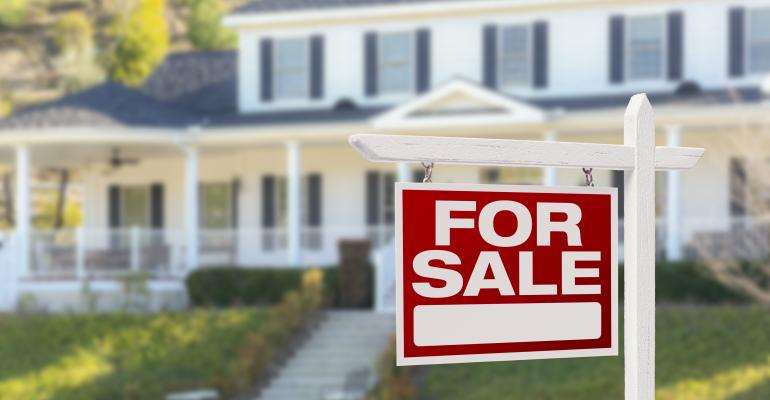(Bloomberg) -- Bill Grabowski, the owner of Healthstar Inc. a pharmaceutical machinery business, has lived with his wife on the same piece of land in Quincy, Mass., for more than 30 years. Now, with U.S. equities imploding and states of emergency being declared across the country, Grabowski has decided to list his four-bedroom, four-bath house for just under $2.7 million. “The worst thing that happens is, nobody buys it,” he says.
Grabowski isn’t alone. Some homeowners have looked at the country’s unprecedented economic and social tumult and decided to put their houses on the market, often with prices that correspond to a booming housing market.
“I can think of three clients I have, off-hand, who said ‘let’s roll,’ says Vickey Barron, a broker at Compass in New York. “Any good agent’s job is to sit down with a seller—not in person, anymore—but to sit down with them and list the pros and cons,” she continues. “Those clients wanted to move forward.”
The list of cons is a long one. The real estate market, particularly in the so-called “luxury” tier, has been struggling for years. “The issue already was getting people through the door,” Barron says. “And then, when they did come in, they were in anything but a hurry” to buy. A Douglas Elliman Miller Samuel report pegged luxury as an average of $2,864 per square foot during the fourth quarter of 2019 in Manhattan.
Now buyers and sellers also have to reckon with near-impossible logistical hurdles, even if a contract does get signed. How can an appraiser get into the building if non-residents are restricted from entering? How, with social distancing, can anyone interview with a co-op board?
“I have someone who’s signed a contract for an apartment on New York’s Upper West Side, and now he’s wondering how he’ll get movers to put furniture into the new apartment,” Barron says. “And if someone’s bought and wants to do a renovation, can they even get contractors in?”
An Ethical Concern
None of this has stopped Billy Armfield, a data scientist for a software company, from listing his 1,400-square-foot, three-bedroom duplex apartment in Brooklyn, N.Y.’s Fort Greene for $1.9 million.
“We definitely watched the market and wondered if it was the best time to do it,” says Armfield, who’s lived with his wife and daughter in the apartment since 2017. “We know there’s also an ethical concern, and we know the world is focused on being safe right now, but we always wanted to come to market in the spring.”
Armfield put his home on the market on Friday, listing it with Erin Boisson Aries and Dustin Crouse of Christie’s International Real Estate’s New York brokerage. “The stock market is definitely down, and that obviously will affect some potential buyers,” Armfield says. “But interest rates have also plummeted, so that is going to give buyers easy credit.”
It’s those historically low interest rates, sellers say, combined with a belief that their own houses are in some way unique to the market, that has led them to list. “For us, I think what it came down to is market positioning,” Armfield continues. “The apartment has lots of character, and it is unique relative to the other inventory on the market.”
He cites the house’s 300-square-foot private deck, its access to a 1,200-square-foot shared garden, and its prewar details. “There’s a limited supply of apartments like this, and a growing demand.”
Faith in Demand
Even as sellers are listing houses, multiple brokers say contracts are being signed this week, particularly for houses below $1.5 million.
“Especially first-time homebuyers, [the stock market collapse] isn’t relevant to them because they need a home,” says Josh Stiles, a broker with Compass in Boston, who listed a $2.1 million condominium a block from Boston Common last week. “That market has minimally been affected.”
He says that he’s brokered two signings in the last five days—one for a single-family house that sold for $600,000 in Winchester, a suburb outside Boston, and another in the South End area that sold for $1.1 million. “There were six offers, and it went into contract above ask,” Stiles says.
Faith in ongoing demand led Lenny Moreira, who has retired from the construction company he founded, to list a studio apartment at 330 Third Ave. in New York that had formerly been occupied by his son.
“Now he’s moving to Colorado, and I don’t want to rent it out,” says Moreira, who says that he also “dabbles” in buying, selling, and renting real estate in Manhattan and California. “With interest rates this low and the stock market crashing, I believe some people are going to want to put money in brick and mortar, instead of gambling with stocks,” he says.
He’s going to list the apartment for about $525,000, well above the roughly $400,000 he says he paid for it seven years ago. “I could keep the apartment indefinitely,” Moreira continues. “But I think people are going to continue to invest in real estate. I could be wrong.”
That uncertainty remains, however optimistic sellers might be.
“If people don’t have the money right now, maybe the market will come back in a month ,and they’ll say, ‘Let’s go back and look at that house again,’” says Grabowski.
“But we built this house, and we love it. You can fish for stripers right off the beach, and then in 15 minutes you can be in downtown Boston at a Red Sox Game—if they ever start playing again.”
To contact the author of this story:
James Tarmy in New York at [email protected]
To contact the editor responsible for this story:
Justin Ocean at [email protected]





